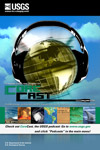USGS CoreCast
It's natural science from the inside out.
USGS Podcasts Home > CoreCast Home Page
Can't see Flash? Install Flash Player.
Next page
|
85
|

Attention citizen scientists: We need your help watching the way the world changes! For nature, timing is everything. So how does climate change affect the timing of things like flowers blooming and animals migrating, and why is this so important? Learn more, and find out how YOU can help us by observing the world around you from USGS scientist Jake Weltzin, Director of the National Phenology Network. (9:46) | Transcript/Links | |
|
84
|

The United States faces the potential for abrupt climate change in the 21st century that could pose clear risks to society in terms of our ability to adapt. USGS Associate Program Coordinator for the Office of Global Change John McGeehin discusses a new report on the potential for abrupt climate changes from global warming during this century. (8:41) | Transcript/Links | |
|
83
|

A roundup of the December 2008 and January 2009 hazard-related events around the world, with some newsworthy tidbits. (6:24) | Transcript/Links | |
|
82
|

Temperature change in the Arctic is happening at a greater rate than other places in the Northern Hemisphere, and this is expected to continue in the future. As a result, glacier and ice-sheet melting, sea-ice retreat, coastal erosion and sea level rise can be expected to continue. USGS scientist Joan Fitzpatrick discusses a new report on past climate variability and change in the Arctic. (11:15) | Transcript/Links | |
|
81
|

Mount Redoubt in Alaska is likely to erupt within days or weeks. We talk with USGS Volcano Hazards Program Coordinator John Eichelberger to find out more details. Click Transcript/Links below to also see some video footage of Redoubt. (5:08) | Transcript/Links | |
|
80
|

Yellowstone National Park has experienced several hundred small earthquakes in the past few weeks. So what's going on? Dr. Jake Lowenstern, USGS Scientist-In-Charge at the Yellowstone Volcano Observatory, tells us what's happening and how scientists monitor volcano and earthquake activity at Yellowstone. (8:08) | Transcript/Links | |
|
79
|

In this episode: California wildfires, the Great Southern California ShakeOut earthquake preparedness drill, landslide potential, and a magnitude 7.5 off the coast of Indonesia that prompts fears of a tsunami. (4:31) | Transcript/Links | |
|
78
|

Safe drinking water supplies are critical to maintaining and preserving public health. But how healthy is that resource? A recent USGS study found low levels of man-made chemicals in water entering and leaving drinking water treatment plants. USGS lead scientist Greg Delzer explains the findings of this study. (7:42) | Transcript/Links | |
|
77
|

More accurate predictions of future climate and improved understanding of today’s warming are possible with new data from the first comprehensive reconstruction of an extreme warm period. Past warm periods provide real data on climate change and are natural laboratories for understanding the global climate system. USGS scientists Harry Dowsett and Marci Robinson discuss this research and implications. (7:08) | Transcript/Links | |
|
76
|

Secretary of the Interior Dirk Kempthorne and USGS Director Mark Myers reflect on the successes of The Great Southern California ShakeOut—the largest earthquake preparedness drill in U.S. history. (11:31) | Transcript/Links | |
Next page


